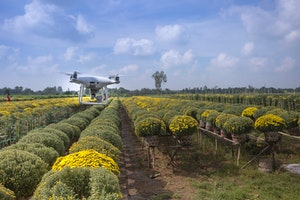New revolution in agri-tech may lead to loss of farming knowledge
14 September 2020

Farmers worried that too much emphasis on positives of new tech may lead to negative social consequences
Farmers have expressed their concerns that new technology may not live up to the promises of better yields and improved environment, and could lead to a loss of traditional knowledge and lifestyle according to a new study.
New research published in the Journal of the European Society for Rural Sociology reveals that while media representations and policy documents have focused on the positive effects, farmers are concerned about the potential negative effects of new agricultural technology.
In a series of interviews with farmers and farm advisers, the team from the University of Reading and University of East Anglia heard a mixed picture of the ‘fourth agricultural revolution’. Responses included concerns about the loss of traditional farming knowledge gained through experience as well as the adoption of new technology having an impact on finances and farm labour.
Dr David Rose, the Elizabeth Creak Associate Professor of Agricultural Innovation and Extension at the University of Reading said:
“The clear picture that we are getting from farmers is that they are expecting to see winners and losers from the widespread innovation in agriculture tech in the coming years.
“The rose-tinted view of the next revolution in farming technology that is portrayed in policy documents and on the media showcases the cutting edge, but it’s a long way away from the realities of most farmers who express concerns over the affordability of new technology, and the effect that it will have on their lives as well as livelihoods.
“One of the impacts that farmers are concerned about is how farm automation is going to lead to a loss of traditional knowledge gained through experience, which may have an impact on the way farming as a career is passed down. While much is made of the appeal of new technology to attract younger generations to farming, there is a double edged sword for many in the industry as experiential understanding of farming may be lost.”
“Other concerns including the feeling that new technology, such as that adopted in dairy farming, will lead to an ‘always on’ mentality which will negatively affect work-life balance and may lead to a decline in mental health.”
Read Dr David Rose’s blog, The fourth agricultural revolution is coming – but who will really benefit? on the Conversation here
The research team spoke to 10 farmers from a range of types (arable, livestock and mixed use) and five farm advisers who are seen as influential stakeholders in the adoption of farm technology. The team also noted that the sample was weighted towards farmers who were more likely to adopt technology (arable and dairy sectors in the East of England) rather than upland or lowland livestock farmers.
Full citation:
Rose, D.C., Barrett, H., 2020, Perceptions of the fourth agricultural revolution: what’s in, what’s out, and what consequences are anticipated? Journal of the European Society for Rural Sociology. DOI: 10.1111/soru.12324
